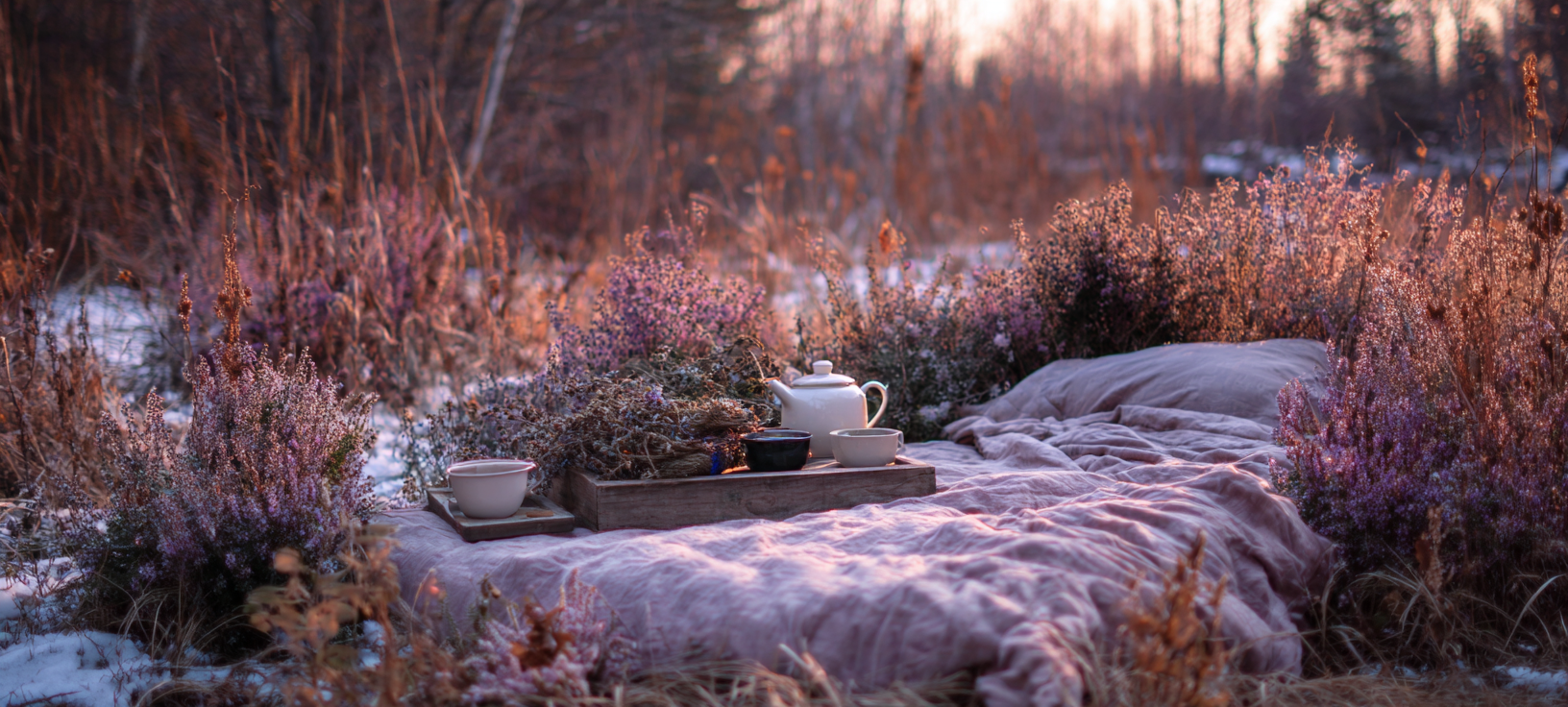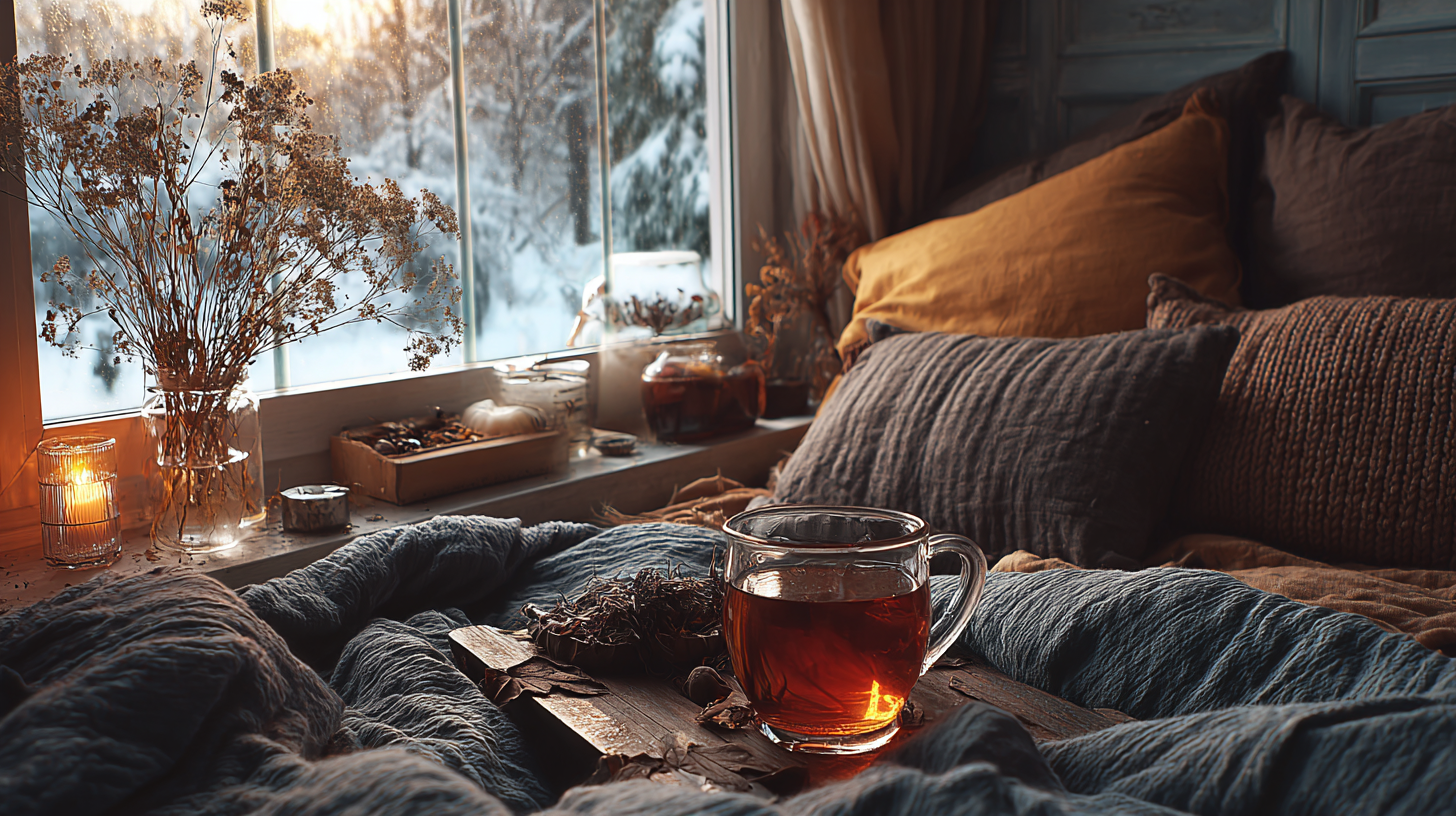The Art of Rest: Herbal Wisdom for Deep Winter Sleep
As we move deeper into autumn and the early whispers of winter, the world is turning deeper and deeper inward. This is a season of descent; a time when nature itself tucks in, slows down, and restores from the inside out.
In these colder months, sleep becomes one of your greatest medicines. Not just physical rest, but the kind of deep replenishment that nourishes your nervous system, steadies your emotions, and brings your inner fire back into balance.
Yet this is also the time when many people tell me they are struggling the most with sleep: waking often, feeling wired at bedtime, sinking into low mood, or tossing and turning with a restless mind. Winter amplifies what is already moving inside of you. Understanding the deeper roots of sleep imbalance is the first step toward restoring it.

Understanding the Roots of Sleep Imbalance
Before turning to herbs or rituals, it is essential to understand why your sleep may be disrupted. Sleep does not break down without reason. Both modern physiology and traditional systems offer valuable lenses of some of the challenges you might face.
1. Circadian Disruption & Overstimulation
Evening screen exposure, late-night stimulation, bright lights, irregular routines — all of these can interfere with melatonin production and confuse your internal clock. When your circadian rhythm is misaligned, your body simply struggles to drop into rest.
2. Nervous System Imbalance
Months (or years) of stress, rushing, emotional overload, or pushing through fatigue can gradually dysregulate the nervous system. This often appears as:
- difficulty unwinding
- taking long to fall asleep
- waking frequently
- feeling "tired but wired"
Herbs can support these patterns, but the root requires tending to your daily stress load and restoring a sense of safety in the body. Join the 7-day Stress Reset to receive tools for stress relief with herbs.
3. Hormonal Fluctuations
Sleep and hormones are intimately linked. Evening cortisol spikes, low progesterone, and blood sugar swings can all disrupt sleep or make it lighter and more fragmented. Winter often amplifies these rhythms because the body naturally shifts into a more yin, restorative state. Supporting hormonal balance may be an important part of restoring deeper rest.
4. Constitutional Imbalance (Too Much Cold or Heat)
From a constitutional perspective, running cold often contributes to restlessness, tension, or waking unrefreshed. Especially in winter, when circulation slows and the body pulls energy inward.
Warm constitutions, on the other hand, may become overstimulated or overheated,
which also disrupts rest.
Choosing foods, rituals and herbs based on your constitution helps address the
root instead of treating the symptom.
5. Traditional "Organ Clock" Patterns (TCM Perspective)
In Traditional Chinese Medicine, the time you wake can reveal which organ system is calling for attention. For example:
- 1–3 AM — Liver (processing, stagnation, emotional overload)
- 3–5 AM — Lungs (sadness, grief, release)
Other contributing factors include menopause, anxiety, digestive disturbance, or thyroid imbalance. Herbs can support many of these underlying causes, but first, understanding your pattern allows you to choose the right allies.

Why Winter Makes Sleep Essential
Winter is the season of deep yin — inward, quiet, slow. If you continue moving at a summer pace, your body will let you know. Sleep is one of winter's primary medicines. It replenishes the nervous system, steadies the emotional body, and guards your inner warmth.
Honouring this season means honouring slowness: darker evenings, earlier nights, warm nourishment, less stimulation, more restoration.
A Nightly Ritual for Winter Rest
For many it is vital to ritualize your bedtime routine. This is a grounding ritual that supports the root causes of sleep imbalance rather than masking the symptoms:
Step 1. Dim the world early
Turn off screens and bright lights at least one hour before bed. This is essential for circadian repair. Consider which restorative practices—like journaling, meditation/breathwork, sipping soothing teas, or gentle yoga/stretching—you can start incorporating into the wind-down period before going to sleep at night. Visualize yourself removing the weight of the day, layer by layer.
Go to bed early. Ayurveda teaches that the body prefers sleep before 10 PM. Some say that the deepest physiological repair occurs between 10 PM and 2 AM (cellular repair, hormone regulation).
Step 2. Support your constitution with the right herbs
Herbs chosen with intention can work deeply:
- Cold constitutions: warming allies such as valerian, and ashwagandha
- Warm constitutions: cooling, soothing allies such as chamomile, lavender, passionflower and blue lotus.
These herbs are well known for supporting sleep imbalance:
- Chamomile: cooling, calming, supports digestion + stress patterns.
- Lavender: said to soften emotional heaviness, helps the mind release.
- Passionflower: traditionally used for anxiety, or tension.
- Valerian: warming, supportive for cold constitutions and deep physical tension.
- Blue lotus: said to open the emotional body, support dream work, and bring relaxation.
- Ashwagandha: grounding, warming, and especially worked with for those who fall asleep but wake repeatedly.
You might need different ones though, depending on the root cause of your sleep problems.
Step 3. Warm oiling ritual
A deeply grounding ritual that calms the nervous system. Warm a rose or lavender-infused oil and massage the feet, ankles, and calves. This practice can make an immediate difference in falling asleep.
Winter rest is sacred. It is the body's medicine, the spirit's renewal, and the nervous system's balm. By tending to root causes, honoring the season, and using herbal allies wisely, sleep becomes not only achievable but transformative.
Safety first. It's important to approach herbs with care and respect. Some herbs may not be safe during pregnancy, breastfeeding, or when combined with certain medications. Always consult a professional herbalist or healthcare provider before incorporating herbs into your routine. This is not medical advice.
